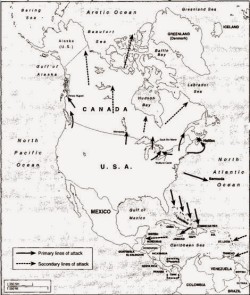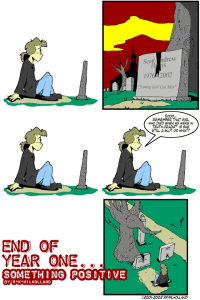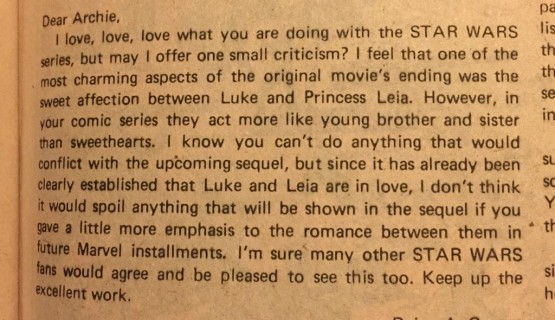Blog Archives
Urban cores are growing, but suburbs are growing more.
Are TV makers ruining our movie experience? Noted conservative (and Ordinary Times critic) Sonny Bunch calls for prohibition. Personally, I’d been wondering what feature it was that my father’s TV has that mine does not so that I can make sure that my next one has it. I’m pretty sure that’s the one.
Olive Garden’s Never Ending Pasta Pass is ending, and Hayley Peterson talked to some people who took advantage and ate at Olive Garden every day. Apparently, the only downside was the food.
I’ve long speculated that the future of legal pot may lie with the much-maligned tobacco industry. Apparently, they’ve peeked into it themselves. It’s one thing they could do to perhaps help their image.
Ever wonder where high concentrations of trailer parks are? Here you go.
With corporate mergers all the rage, should countries do the same? Greg Rosalsky looks at a USA-Mexico merger, and (kind of wistfully) finds it unlikely. The thing about corporate mergers is that they tend to benefit both parties. It’s hard to see a US-Mexico merger as doing that.
Jennifer Anghju Grossman gives tips on dating Objectivistly.
Maybe instead of micro-apartments, we need micro-micro-apartments! Featuring 86sqft apartments in Paris. Or, if you need something just a bit bigger, here’s a video on how you can fit 1100sqft into 420.
Wow, some whales are over 200 years old, meaning they were born before Moby Dick was written.
Four years after Fukishima, nuclear is making a comeback in Japan.
What happened to the proposals for the 30-hour workweek? Benjamin Kline Hunnicutt says that the New Deal killed it.
 This post includes spoilers of Harry Turtledove’s Southern Victory series, up to the Settling Accounts series. If you’re interested in reading the series, I don’t think that it will ruin the story for you. Turtledove’s storytelling doesn’t particularly lend itself to surprise endings.
This post includes spoilers of Harry Turtledove’s Southern Victory series, up to the Settling Accounts series. If you’re interested in reading the series, I don’t think that it will ruin the story for you. Turtledove’s storytelling doesn’t particularly lend itself to surprise endings.
Vox presents thirteen maps of things that never happened. The one to the left is the first one, which involves plans to invade Canada.
We, of course, have very little reason to ever invade Canada. Our only route to incorporation is this one, and at this juncture they’re probably more likely to take from us than we are from them.
—
Turtledove’s WWI alliances[/caption]I’ve been working my way through Harry Turtledove’s work. Right now I am audioreading his “Atlantis” series (wherein the eastern part of the US broke off from North America to become an island continent). Prior to that, it was his “Southern Victory” series, wherein the south won the Civil War. The books track the alternate timeline from the 1880’s to World War I and now* the world embarks on World War II (except that Hitler’s got a drawl). The biggest departure is history, apart from a dramatically weaker United States, is that it changed the course of history in World War I. In short, the United States and Germany emerged victorious over the CSA, Britain, and France.With Canada being a part of the UK, of course, they were also among the losers. The biggest losers, in that by the end Canada ceased to exist. With the exception of Quebec**, it was incorporated into the United States. Portions of the Confederacy (including but not limited to what we call West Texas, Oklahoma, and Kentucky) were also taken. Due to the political considerations***, Oklahoma (“Sequoia”), West Texas (“Houston”), and Kentucky (“Kentucky”) were granted statehood while the Canadian provinces were not. The novels follow three different Canadian storylines, from the perspective of an American in Ontario, from a Canadian insurgent in Manitoba, and a citizen of the freshly minted Republic of Quebec.
The lesson, on both the Confederate and Canadian fronts, is that occupation is hell. Not just for the occupied, but for the occupiers. And it’s really, really difficult to reconcile with a remotely liberal democracy.
I often wonder to myself how much better off, or worse off, most of Mexico would be if we’d never signed the Guadelupe Hidalgo treaty and marched on Mexico City, and how much better off the Philippines would be if we’d never left. Given the populations of both of those places, though, it would have been next to impossible to stay with a hostile population. We weren’t quite the liberal democracy – at least as far as Mexico is concerned – we were then that we are now (or at least theoretically strive to be), making the whole thing a non-starter. (Points to David Alexander for being the first person to really point this out to me.)
* – The series is complete. Unfortunately, the last four books were never recorded. So I’m having to read them, and I haven’t quite gotten to them yet.
** – It was rather a stroke of genius on Teddy Roosevelt’s part. The US was ill-equipped for a Francophone state. And negotiating an independent Quebec made an immediate ally in separating Canada. The confederacy probably would have been better equipped for incorporating Quebec, as it (ironically) had more of a multicultural streak and a system that could incorporate such. Not only did they have the primary Spanish-speaking states of Sonora, Chihuahua, and Cuba, but they had a comparatively benign policy towards Native Americans, leaving them to govern Sequoia (Oklahoma). They also would have been better positioned to avoid the conflicts with Utah if they had been so inclined, though the Confederacy evidently had a particular disdain for the Mormons.
*** – The two parties are the Democrats and the Socialists, with Republicans being little more than an afterthought. Teddy Roosevelt, a Democrat, knew that the Canadian provinces would likely vote Socialist. Further, there was more of an impetus to try to solidify their holdings on the former Confederate states to strengthen the hand of those who did not want to return to the Confederacy. Though solidifying the Americanness of the Canadians also may have been wise policy, it was less urgent because they had no nearby country to return to.
Marc Lore was made half a billionaire by Amazon, and he’s apparently declaring war on them. Here’s his pitch:
Like Costco (COST), Jet plans to make money on membership fees. Every other savings will be passed along to the buyer. And like EBay (EBAY) and the dominant Chinese e-commerce player, Alibaba.com (BABA), it will function primarily as a marketplace, allowing other merchants to compete to offer their wares to customers. But there’s a twist: Shoppers can squeeze out more savings if they can control the urge for instant gratification and let Jet figure out how to deliver the goods as economically as possible. For example, prices can drop when a shopper combines multiple orders into a single shipment or is willing to wait for a seller offering a more economical shipping option.
I’m a happy member of Amazon Prime. It’s the perfect storm for instant gratification. I also frequent eBay, though, when I am looking for something a little less interest, but with a touch less urgency.
The “wait for a better price” model appeals to me, as it is often how I use eBay. I often want something, but don’t need it right away. So I basically keep an eye on eBay once a week or so until the product hits a certain price point. Then I’ll buy it. Lately I’ve been waiting for a good Thinkpad T520/W520 for under $600. I wish there were a way to reverse the eBay model a bit, and instead of bidding price on something I want relatively now, I can simply put a price out there and wait for someone to list it at that price.
 Google had the wacky idea of using solar-powered balloons to supply Internet service. It worked!
Google had the wacky idea of using solar-powered balloons to supply Internet service. It worked!
NASCAR driver Kurt Busch wants a protective order against his ex-girlfriend, who he claims is an assassin.
Less than wise: Taking selfies on an iPhone you just stole.
I was excited to hear about the Obama Administration’s plans to scale back asset forfeiture. Looks like there may be less to it than meets the eye. Darn. Still better than nothing, I suppose.
In the words of one of the Popehats (Patrick or Ken), “The Internet is like a huge, violent maniac who shows up occasionally and beats the shit out of unlucky mean people.”
Lost Beagle! Found! On Mars.
This is probably not good: A for-profit college investment firm now has a controlling interest in Inside Higher Ed.
The story of an 18-year old who plans to marry her long-lost father. I didn’t know that “Genetic Sexual Attraction” is actually a thing. Here’s another disturbing tale.
League of Ordinary Gentlemen alum Barrett Brown – since sentenced to five years – explains how he got kicked out of a prison.
Mitt Romney may or may not be the right man for the GOP in 2016, but a number of the arguments against him are a bit dubious. He has generally polled surprisingly well (recent ABC/WaPo poll aside), and I’ve thought that a lot of people have been too quick to dismiss him… if only because I don’t see a whole lot of other better candidates.
Meet the guy who has seen it all before. Like non-stop, for the last eight years.
Colton Burpo did not come back from heaven, after all.
It’s not often I say this, but I’m kind of with the rich New York lawyers on this one.
As some of you may recall, I’m kind of a tall guy. I’m not quite as tall as a couple of my friends, who have me by an inch or two, but I’m not used to people being particularly taller than I am. It’s kind of intimidating in its unusualness. People taller than I am are freaks.
Today at the post office, I was in line with a guy who was very, very tall. In between us was a woman who was not short who said that she couldn’t remember the last time she felt so short. She asked the freakishly tall guy how tall he was. 6’11”, it turned out. I was glad that she asked, because I was kind of curious myself. But I wasn’t going to ask. I wanted to comment about how unusual it is to be the short guy. To look up at other guys. And get to make a joke about the weather being up there.
But I didn’t.
I suspect he’s heard those jokes before.
This corresponds with my experience: Employees of small and locally owned businesses tend to display more loyalty.
Church attendance can effect commitment to one’s job. Interestingly, it seems to suggest that perhaps prosperity gospel is actually kind of a good thing.
Yes, yes, there’s no such thing as free shipping. The thing is, free shipping isn’t about getting something for nothing as it is about price transparency and reliability.
What if some people tried to racist-bait a controversy and nobody showed up?
How Appalachians and ruralians became the new noble savages.
Megan Garber writes a eulogy for clip-art.
According to Alana Semuels, women are increasingly finding men they know to be sperm donors, instead of going the anonymous route.
Remember, if you oppose fracking, you ride with Putin.
New research into why our men and women of the uniform marry young.
Hurricane Katrina may have been a disaster, but the migration it caused was beneficial.
The title of this article (Non-Nerds Would Rather Bomb Their SATs Than Look Uncool) is actually a tad deceptive. More like, non-nerds will turn down help if they think it will make them look uncool… or like they need help.
Second jobs and part-time work won’t help you get a mortgage. That may make sense when it comes to people like Jeff Banks, but I find it really odd that it applies to a family willing to make a 20% down-payment.
It’s important to remember that zoning is about increasing livability, and has nothing to do with economic and racial segregation.
Apple deleted unauthorized music from your iPod? I didn’t kow that. Uncool.
 Joe Carter gives nine things you should know about adoption.
Joe Carter gives nine things you should know about adoption.
OpenBorders writes about Argentina, which has made migration a fundamental human right (almost).
Most of these redesigned license plates look a lot better than the real ones (though at least a couple might impair a license plate’s core functionality).
Eurozone membership isn’t free.
This is a pet peeve of mine. Legos are for experimentation, not following instructions. On the other hand, I know that a lot of the legos I had were originally from sets, and after a while it all blends together as instruction manuals get lost.
Here’s a 90-minute BBC movie about Texas.
Portugal is having difficulty enforcing its immigration law, with visas essentially being sold to wealthy foreigners.
Arthur Books argues that the Mormons have figured out the trick to being virtuous.
Demons exist!
Thailand may be banning commercial surrogacy.
Kenneth Warner and Harold Pollack come up with a comprehensive gameplan to virtually end tobacco addiction, using just about every tool they can find. I disagree with some of it (smoking bans should not be an effort to get people to quit), but actually find myself agreeing with a lot of it and fascinated by other parts of it (the pH levels).
What’s up with the electrical field outside Google’s London office?
It turns out, men on a sexual hookup site behave quite superficially. I’m not sure what this has to do with men and dating in general, though.
Proof that the surveillance state sees as as a bunch of monsters.
In the exciting (or so I hear) game between the Green Bay Packers and Seattle Seahawks, Aaron Rodgers through a pivotal interception on what he thought was a free play:
What does it say for the game even though you had two INTs: “The defense played great. Felt like we might have had an offsides on the first interception. Corey snapped it early — I figured it was a free play — and Davante’s was the only route that was going in the end zone. Sherm made a good play. The second one, just miscommunication between Cobb and I.”
Why think it was a free play?: “I saw the end jump; he must not have been in the zone.”
I can’t remember when, but there was a bowl game where a supposedly free play turned out to be costly when the flag was flown for something other than defensive off-sides and an interception occurred.
I remember several seasons back when Southern Tech was playing against the Atlantic State Panthers in a game that was going to determine the conference championship. ASU had thirteen players on the field, and so our quarterback thought he had a free play. For those that don’t know, a “free play” is when the defense commits a penalty and so if things turn out badly you can take the penalty and the yards, but if it goes well you can decline the penalty and take more yards. Free plays lead quarterbacks to just kind of throw the ball up there and if your guy catches it then great but if their guy catches it then no harm.
Which is all fine and good, if the flag is what you think it’s for. In the case of Sotech, it wasn’t. There wasn’t irrefutable evidence that the two State players had not gotten off the field (though it was pretty obvious). The Panthers intercepted the ball in the endzone. The entire tide of the game shifted, and we lost a game we were favored to win by a touchdown.
Ever since then I’ve taken note of when “free plays” backfire and it seems to happen quite a bit. Sometimes, as in this case with Rodgers, it works out. But I wonder what the ratio is between great plays and backfires. I wouldn’t be at all surprised if the latter outnumbered the former.
 Zoroastrians feed their exalted dead to vultures.
Zoroastrians feed their exalted dead to vultures.
Overeating is contagious! Quick, let’s to tell the fatties that they have to stop overeating for the public good.
How employers are attempting to influence their employees’ vote.
Wind turbines negatively affect housing prices. Seems to me that means we should put them in the costlier locations, perhaps applying some housing price equilibrium. Right?
Renting outfits like Rent-a-Center are helping people pay three times cost so that they can have nice things. The thing that sucks about markets is people.
Generous loan terms are being used to entice customers to buy more expensive cars. The thing that sucks about markets is people.
Bloomberg News thinks that China’s megacities just aren’t big enough.
Ever wondered about the Mormons’ “magic underwear“? Well, they explain it in a new video.
I’m not sure that these 1920 Soviet oil paintings featuring mechs are actually authentic.
These diagrams of co-sleeping positions and these captions on these stock photos are hilarious.
The Economist writes about the rise of the web comic:
In 2012 he is finally getting his way. As the newspaper industry continues its decline, the funnies pages have decoupled from print. Instead of working for huge syndicates, or for censored newspapers with touchy editors, cartoonists are now free to create whatever they want. Whether it is cutting satire about Chinese politics, or a simple joke about being a dog, everything can win an audience on the internet.
This burst of new life comes as cartoons seemed to be in terminal decline. Punch, once a fierce political satire magazine whose cartoons feature in almost every British history textbook, finally closed its doors in 2002. The edgier Viz magazine, which sold a million copies an issue in the early 1990s, now sells 65,000. In the United States, of the sprawling EC Comics stable, only Mad magazine remains, its circulation down from 2.1m in 1974 to 180,000. Meanwhile, the American newspaper industry, home of the cartoon strip, now makes less in advertising revenue than at any time since the 1950s.
 It tracks the rise and fall of the newspaper strip, to the rise of the web comic. It has all the trappings of an unconvincing web-bang-bam piece, but is actually a quite good article and makes a good case that the web truly does provide a better outlet for cartoonists rather than just acting as a farm system (as blogging often does).
It tracks the rise and fall of the newspaper strip, to the rise of the web comic. It has all the trappings of an unconvincing web-bang-bam piece, but is actually a quite good article and makes a good case that the web truly does provide a better outlet for cartoonists rather than just acting as a farm system (as blogging often does).
I don’t read any comics, web or otherwise, on a daily basis. The only one I’ve read thoroughly is Something Positive, and at times Real Life. which I will get to in a minute. I’ve heard a lot of good things about MegaTokyo, though it is (like the article says) hard to get into if you didn’t start… a long time ago. XKCD is iconic, of course, but I mostly go there only when someone links to it. It seems that most webcomics are either one-offs like XKCD, in which case I have a hard time getting really into them, or they’re involved like MegaTokyo or Something Positive, which require a lot of investment.
It’s kind of difficult to read the latter on a computer. They sell merchandise, but what I really want is an ebook or ecomic so that I can devote some time and sit down and read it conveniently. Even though they’re free online, I would actually pay – and possibly pay well – for the convenience of being able to read them on a Kindle or tablet. Because I’m bad about reading comics daily, I tend to read Something Positive in spurts. Years at a time. Often, actually, starting from the very beginning and getting up to the new stuff that I haven’t read. I’ve read about 10 years worth of SP, and have about three years left to read, but I’d easily pay $10/yr, or maybe even $20, for every year he’s got.
It’s not entirely unlike how some CD prices have fallen to the price of MP3s, but I’d spend a couple extra dollars on MP3s just to save myself the trouble of ripping the CDs.



